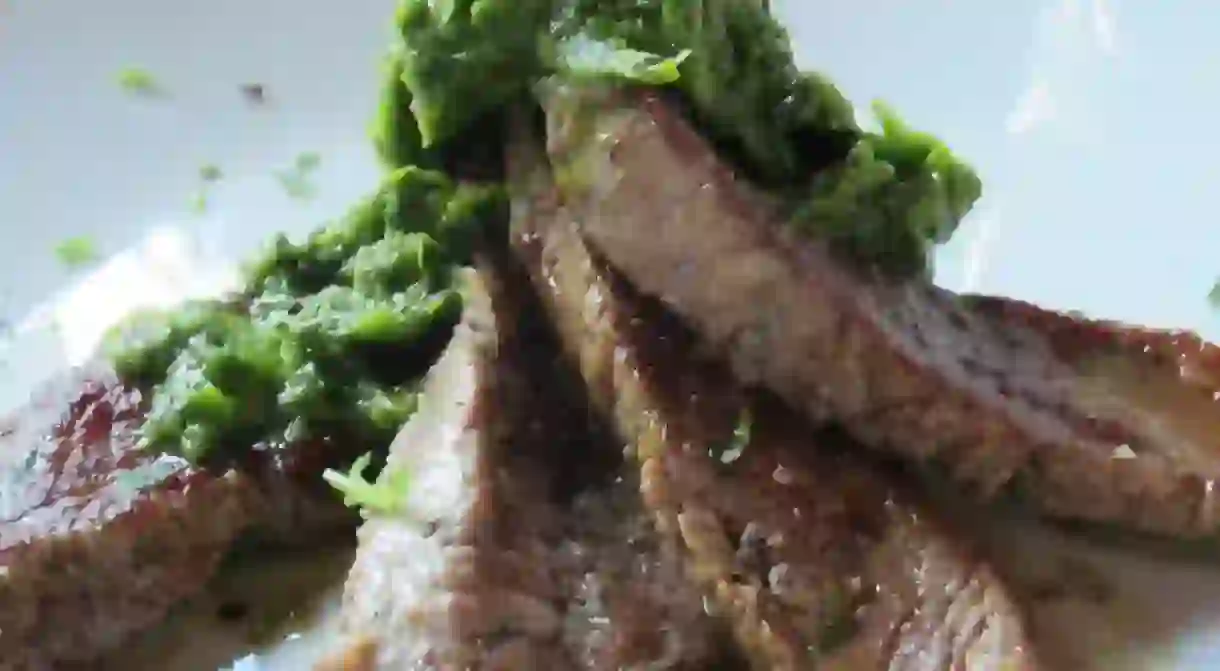A Brief History of Chimichurri: Argentina’s Favorite Sauce

Chimichurri. Go ahead. Say it. Roll the Rs. Enjoy the sound and take the sauce seriously. Chimichurri is an uncooked sauce used principally on grilled meat. Available in both green (chimichurri verde) and red (chimichurri rojo) varieties, it stems from Argentine cuisine. Here’s everything you need to know about where it’s from and how to use it.
Argentine in its origins, chimichurri is typically made of finely-chopped parsley, minced garlic, oregano and white vinegar – though there are regional variations, with Uruguay adding red pepper flakes for an added kick. The name’s origin is unclear. Numerous linguists hold the name, chimichurri, as derived from Basque’s tximitxurri, pronounced chee-mee-CHOO-ree; stumbling interpreted as ‘a mix of several things in no special order’.

Another story claims that the name comes from ‘Jimmy’s curry’, Jimmy, being an Englishman who joined the fight for Argentine Independence. His name, being difficult for Argentines to pronounce, morphed into chimichurri.
Miguel Brasco, an Argentine food critic, believes the word was coined when the British failed in their invasion of Rio de la Plata in 1806 and were taken prisoner. The detainees requested condiments for their food and mixed English with Spanish.
Perbacco chef, Staffan Terje believes that chimichurri is identical to Sicily’s salmoriglio sauce, which is served mainly on seafood.
Food historians think that chimichurri was invented by gauchos to flavor meat cooked over open fires. If so, the gauchos probably used dried herbs as fresh herbs would spoil.

Four chimichurri myths put to rest
It’s not pesto
Chimichurri is not an Argentine style of pesto. Some look similar, but they have distinct flavors. Pesto contains basil, olive oil, garlic, nuts, and cheese. Chimichurri has oil, water, vinegar, parsley and assorted herbs and vegetables as well as other spices blended in. Pesto is affiliated with pasta. Chimichurri goes with grilled meats.
It’s not Argentine ketchup
No, chimichurri is not Argentina’s version of ketchup. Argentines use ketchup just as people in other nations use it. What you won’t see is people layering ketchup on their grilled meats. That’s what chimichurri is for. Chimichurri is not used for dipping fried potatoes, sprinkled on hot dogs or put on hamburgers.
It’s not a marinade
Chimichurri is not a marinade. It is seen mainly as a flavoring for grilled sausages, meats and offal. Like any sauce, chimichurri is used by some as a marinade, but it is one of dozens.

It’s not pureed herbs
Again, no. Pureeing herbs, vegetables and spices do not make chimichurri. For example, consider mayonnaise. Mayonnaise is an emulsion of blended oil, egg, and acidic liquids, like lemon or vinegar. Are all such mixtures containing oils referred to as mayonnaise? No. Throwing cilantro, limes, tomatillos, avocados and chipotles into a blender doesn’t make chimichurri.
Argentina’s chimichurri is the original and the best. Just ask any Argentine.













